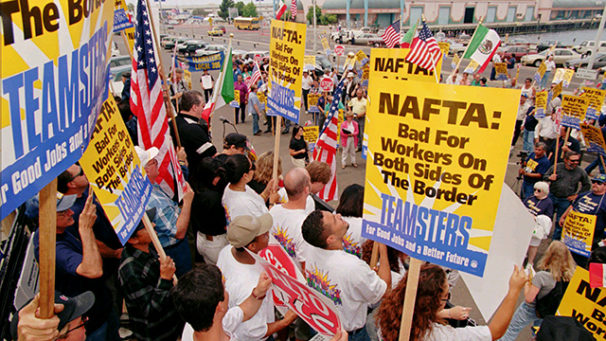
This article won Second Place Award Best Analysis in the 2018 International Labor Communications Association’s Labor Media Awards. 
On May 18, as expected, the Trump administration announced that it intends to renegotiate the North American Free Trade Agreement (NAFTA). This starts a mandatory 90-day waiting period, during which there will be intensive discussions in all three NAFTA countries – the United States, Mexico, and Canada – about what, exactly, will be the changes asked for by each.
Critics and opponents of the treaty, which came into force on January 1, 1994, are already mobilizing to make sure that whatever happens, the rights of workers, small farmers, indigenous and Afro-descendent people, and the environment are fully protected.
There have been few specific hints from the Trump administration so far as to what changes it will demand. Administration officials have suggested that the rise of e-commerce in the years since the start of NAFTA might require some changes in the original treaty, but this is not likely to be the only issue.
During the 2016 election campaign, Trump suggested the U.S. might demand new taxes affecting products of U.S. companies that outsource to Mexico and then are shipped to the United States. However, the most powerful business interests in the United States, who see NAFTA and treaties like it as the geese that keep laying the golden eggs, are likely to strongly oppose anything that weakens their profit-making options.
During the election and since, Donald Trump has tried to convince U.S. workers that Mexico took the United States to the cleaners in what he claims was a horrible trade agreement. His fulminations against NAFTA dovetailed neatly with his racist characterization of Mexican and other Latino immigrants as “bad hombres” who steal the jobs of U.S. workers, sponge off our tax-supported social welfare institutions, and are responsible for a mostly imaginary wave of violent crime. Other GOP politicians have been repeating this nonsense.
There are, however, plenty of valid complaints about NAFTA coming from ordinary people in all three countries.
Trump’s stated purpose in “renegotiating” NAFTA, then, is to make it a “better” deal for the United States and by implication, a worse one for Mexico. His threat to walk away from NAFTA if he does not get what he wants is likely a bargaining ploy. And, be warned, when Trump says “United States,” he does not mean you and me, he means corporate billionaires like his family and cronies.
Winners and losers
There have been winners and losers in all three NAFTA countries, with the losers far outnumbering the winners. But the voices of the winners have been louder, because the winners have been people who have already had the money and power to dominate the conversation in the national legislatures and the corporate-controlled press.

The winners have been multinational corporations, most of which are based in the United States and Canada, but a few of which are based in Mexico too, such as the Grupo Mexico conglomerate.
The losers include the majority of workers in all three countries, and also, especially in Mexico, small-scale farmers. We in the United States tend to assume that Mexico is, like our own country, overwhelmingly a land of wage and salaried workers of one kind of another, with an extremely wealthy agricultural sector (highly automated and controlled and run by big agribusiness corporations) and a relatively small surviving sector of small-scale family farmers. Canada, after all, is similar in this regard.
But at the outset of NAFTA in 1994, Mexico had a proportionally much larger small farmer population producing crops and livestock for its internal markets. The architects of NAFTA, in other words the corporate executives and allied government officials and politicians of all three countries, targeted the Mexican agricultural sector for radical change.
Echoing the “comparative advantage” ideas of classical British economic theorist David Ricardo (1772-1823), they pushed the idea that countries should specialize in the things to which their climate and geography best suit them, and then obtain by trade those things in which they decide not to specialize.
Pointing out the extreme productivity of U.S. and Canadian grain farming, the framers of NAFTA set the goal of dismantling much of Mexico’s traditional grain farming sector. The idea was that by opening up Mexican markets, via free trade, to cheap grain and other agricultural products from the NAFTA partners, Mexican farmers would be driven from their “inefficient farms.”
They would then become a pool of cheap labor for industrial production, attracting investment from the United States and Canada. Some Mexican farmers would get work in “specialized” fruit and vegetable production focused on export to the United States and Canada.
Labor unions in the United States and Canada strongly objected to this because it implied that factories would be closing in those two countries and transferring production, and thus jobs, to Mexico.
In Mexico, small farmers were so outraged at the prospect of being ruined and driven out of their home communities that in the southernmost state of Chiapas, an armed insurrection, led by the Zapatista Army of National Liberation (EZLN), broke out.
Workers and the political left in Mexico also objected to NAFTA, but union opposition was muted by the lack of democracy within Mexican unions, most of which were (and still are) under the thumb of the government and employers.
NAFTA’s aftermath
Twenty-three years of NAFTA have proved both the winners and the losers to be right. In the U.S. and Canada, well paid jobs in industries such as auto have been lost. Ruling class apologists for NAFTA point out that other jobs have been created, but forget to mention that these tend to be low-paid jobs without union representation or benefits.
In Mexico, millions of people have been driven out of the agricultural economy as small farmers found themselves unable to compete with U.S.-derived imports of wheat, maize, and other agricultural products – all of which are subsidized by U.S. taxpayers.
The social safety net was shredded in Mexico as part of the legal framework of the NAFTA agreement. Mexican small businesses were also severely hit under the terms of the treaty.
Some Mexican farmers did, as promised, find work in “specialty fruit and vegetable” cultivation for export, but as extremely low-paid and abused workers in agribusiness concerns.
Industrial jobs in auto parts and other things did move to Mexico, but the joke is that they will only stay there as long as Mexican workers accept low pay and no effective union representation. If those conditions do not continue, the transnational corporations simply move to another country where labor is even cheaper. So wages and salaries in Mexico have not increased under NAFTA, and about half of the population is below the poverty line.
As foreign mining companies have poured into Mexico, encouraged and facilitated by NAFTA, the country’s environment has faced growing degradation, which in turn has had a negative economic impact on the rural population. Personal security has also suffered badly, as the economic disruption under NAFTA has fueled the growth of criminal drug cartels.
Under the NAFTA trade regime, vast numbers of displaced Mexican farmers and workers emigrated to the United States – many without papers because the United States does not give visas to poor people. This makes the Trump crackdown on “illegal immigrants” especially cruel.
So multinational corporations and the rich in all three countries can be listed as winners. Workers in all three countries, plus family farmers in Mexico, are the obvious losers.
A new trade regime is needed
How to break up this game? Workers, small farmers, and other “losers” in NAFTA need to work in unity to demand a completely changed trade regime in all three countries. It must be one that breaks away from Ricardo’s antiquated formulations and also from the neoliberal orthodoxy that international trade requires the shredding of the social safety net, the breaking of labor unions and other people’s organizations, the abandonment of all environmental standards, and the domination of the poor countries by the rich ones and the multinational corporations.
Fortunately, the work toward creating this unity is well under way. From May 25-27, labor and social justice organizations from the United States, Mexico, and Canada met in the Palace of Medicine in downtown Mexico City to coordinate a strategy toward the future of a treaty which those present felt had been disastrous for all three countries.
Participating in the meeting from U.S. were representatives of the AFL-CIO, the United Steelworkers, and the United Electrical Workers. From Canada came representatives of the Canadian Labor Congress, the Confederation of National Unions of Quebec, the Quebec Workers’ Federation, and the Public Workers Alliance of Canada. The Mexican delegation’s labor component mostly came from dissident unions not under the thumb of the government, including representatives from the National Union of Workers (UNT) and the New Workers Central (NCT). There were marches and rallies in Mexico City in conjunction with the meeting.
Many in Mexico, the U.S., and Canada think that NAFTA cannot and should not be saved and should be replaced by a completely new trade regime. However, it is clear that the big business interests which dominate the politics of all three countries will fight tooth and nail. So the issue of “renegotiating” NAFTA now will become central to the class struggle in North America.










